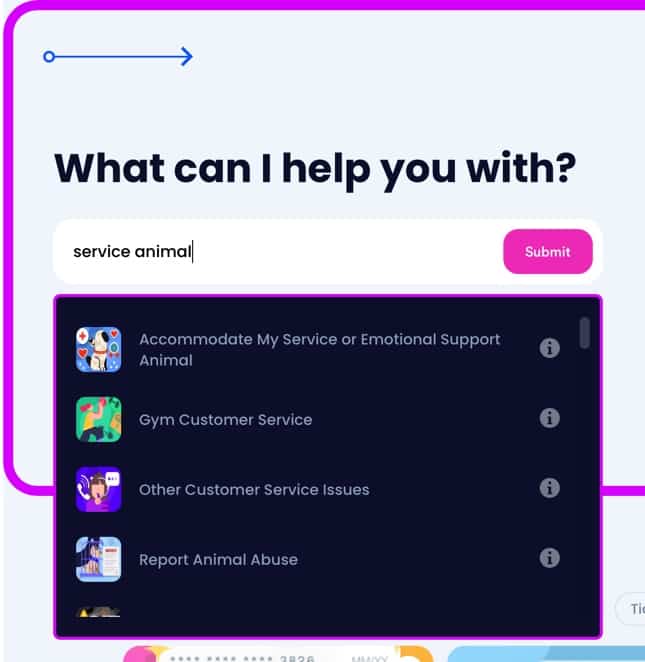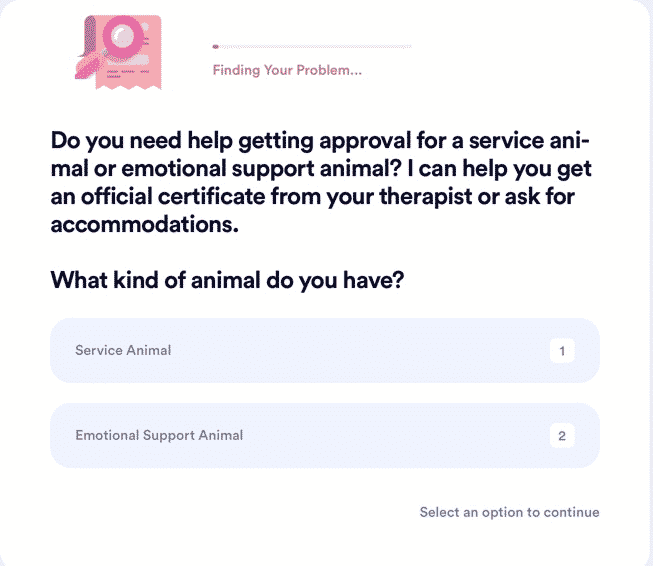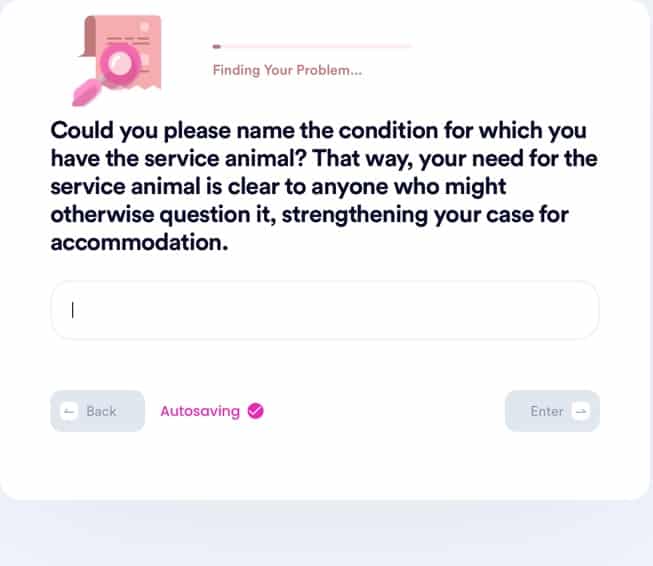Emotional Support Animal vs Service Animal
Animals can help humans in countless ways, so understanding the distinction between an can be confusing. In short, service animals perform specific tasks, while emotional support animals help with mental health issues simply by being present. Service animals have more rights and protections to be in spaces where pets aren't allowed.
Whether you have an ESA or a service animal, DoNotPay can help you make sure your animal has access to the spaces where you need it. This article will provide an overview of the differences between the benefits these animals can provide and where the law guarantees them access.
What Is an Emotional Support Animal?
An emotional support animal, or ESA, is an animal designated by a mental health professional to help a patient with conditions like depression, anxiety, PTSD or specific phobias. ESAs do not have specialized training. They benefit their owners by providing companionship and easing loneliness.
Where Can I Bring an Emotional Support Animal?
ESAs only enjoy special rights in the area of housing. If you have a letter from a mental healthcare provider specifying that your animal is an ESA, you can have the animal in your home even if you live in a building that does not allow pets. This is established by federal law, so it applies regardless of the state you live in.
ESAs are exempt from pet rules and restrictions, including:
- Pet fees
- Pet deposits
- Animal size or breed restrictions
Depending on the type of rental you live in, your landlord may not need to accommodate your ESA. This could be the case if you live in:
- A building with four or fewer units with the owner living in one of the units
- A single family home rented by the owner directly
protection for ESAs primarily applies to housing. Other locations such as hotels, stores and restaurants are not required to accommodate your ESA. To make sure your ESA is allowed by your landlord, you'll need a letter from a qualified mental health professional confirming that your animal is an ESA recommended to manage a diagnosed condition.
What Is a Service Animal?
Service animals have specialized training that allows them to perform specific tasks to assist with a person's disability. This includes psychiatric service animals, which help with mental health problems and are easiest to confuse with ESAs. The distinction between an is that a service animal performs a specific task, while an ESA provides companionship.
Service animals have stronger rights to be in places where animals are not otherwise allowed. Those benefiting from a service animal are protected under the Americans with Disabilities Act. If you have a service animal, you have the right to take your animal to all of the following places:
- Your home
- Your workplace
- All public spaces
- Both K-12 schools and colleges
- Public transportation
- Airplanes and airports
Staff in these locations can ask you whether you need your service animal because of a disability and what tasks the animal performs for you. They cannot ask what your disability is or any other questions.
Difference Between an ESA and a Service Animal
| ESA | Service Animal | |
| Definition | A pet, whose presence is determined to be needed for a patient’s mental health. The pet is prescribed by a licensed mental health professional to a person with a disabling mental illness. | According to the Americans with Disabilities Act (ADA), service animals are dogs that are trained to perform tasks or do work for people with disabilities. |
| Can the assistance animal be banned or restricted when the owner is obtaining housing? | No | No |
| Does the assistance animal have access to public areas? | No | Yes |
| Is the assistance animal allowed on flights free of charge? | No | Yes |
| Will the owner of the assistance animal be charged a pet deposit for living with one? | No | No |
Easily Manage Accommodations for Your Service Animal or Emotional Support Animal With DoNotPay
Navigating life with an ESA or service animal can be complicated. Confirming requirements for everywhere you go can be time-consuming and overwhelming. DoNotPay's fast, easy and successful product can make getting accommodations for your service animal or ESA simpler.
Through our new Service and Emotional Support Animals product, DoNotPay can help you with all of your ESA-related concerns, including contacting your landlord about your ESA, asking airlines about their accommodation options, and finding the most affordable online ESA letter service.
Here’s how:
- Search "service animal" on DoNotPay.

- Select the type of issue you need help with, including contacting your landlord about your ESA/service animal, asking your airline about ESA options, or requesting ESA/service accommodations at other venues.

- Answer a series of questions about your current situation and the details of your ESA/service animal, so we can generate the best results for you.

And that's it! Depending on your issue, DoNotPay will generate a letter to your landlord and mail it on your behalf, contact the airline agency and get back to you with an answer, or send a letter to your mental health professional requesting an ESA letter.
What Else Can DoNotPay Help With?
DoNotPay can help you with just about any problem you might run into with your service animal or ESA. With DoNotPay, you can easily:
- Compare ESA airline policies
- Travel on United with an ESA
- Travel on Southwest with an ESA
- See example ESA letters
- Travel on American Airlines with an ESA
If you need help guaranteeing access for your ESA or service dog, contact now!
 By
By